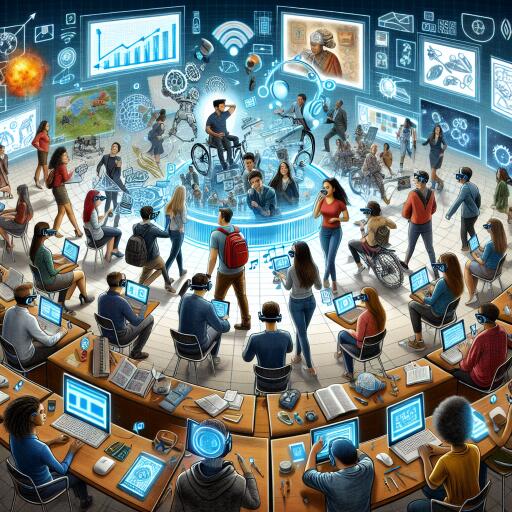Beyond Video Lectures: Revolutionizing Student Engagement | Today Headline
The landscape of digital learning is swiftly shifting away from the sole use of video lectures towards a more interactive and engaging format. With the advent of platforms like LinkedIn Learning, Udemy, and Skillshare, the bar for online education is continuously being raised. For educators, the challenge now lies in how to captivate and maintain student interest within a digital realm.
Traditional video lectures, while essential, mark only the inception of a comprehensive eLearning experience. Integrating these lectures with interactive features such as quizzes, reflective pauses, and bite-sized assessments can significantly boost student engagement. Creating lectures enriched with storytelling and real-life applications also aids in connecting with learners on a deeper level.
Gamification is a transformative approach that redefines learning as a pleasurable and engaging experience. By leveraging elements familiar in gaming, such as points, badges, and competitive leaderboards, eLearning can foster a spirit of motivation and friendly competition among students. Interactive quizzes and simulations tied to the course material can propel learning to new and exciting heights, turning otherwise mundane topics into an adventurous exploration.
Collaboration is another powerful tool in the virtual learning arsenal. Projects that require teamwork not only bridge geographical gaps but also cultivate skills in communication, problem-solving, and mutual learning. By harnessing platforms that support document sharing, online discussions, and group brainstorming, educators can effectively replicate a classroom environment’s collaborative spirit, online.
Immediate, constructive feedback is a cornerstone of successful eLearning. Platforms offering instantaneous responses to quizzes and assignments, alongside personalized instructor feedback via digital means, are crucial for guiding students through their learning journey. This readily available feedback loop supports learners in identifying strengths and areas for improvement.
Leveraging analytics offers a window into student engagement and behaviors, paving the way for tailored content and teaching strategies. By analyzing engagement times, quiz outcomes, and participation rates, educators can fine-tune their courses to better suit their audience, often with significant improvements in learner outcomes.
Facilitating vibrant discussions and interactive sessions where students can share insights, postulate questions, and engage in meaningful debates is invaluable. These exchanges not only deepen understanding but also hone critical thinking and communication skills. Engaging students in forums or live discussions enriches the learning ecosystem, fostering a more collaborative and involved classroom culture.
Employing a variety of multimedia resources such as animations, podcasts, and interactive infographics accommodates diverse learning preferences, ensuring the material remains fresh and engaging. Animation, for example, can break down complex topics into digestible, compelling content that resonates with learners more effectively than traditional formats.
Personalization of the learning journey, through offering choices in modules, adjusting difficulty levels, or shaping the learning path according to progress, maintains student engagement by ensuring the content remains relevant and appropriately challenging. Such tailored experiences make learning more dynamic and personal.
Emerging technologies like Virtual Reality (VR) and Augmented Reality (AR) offer unprecedented immersion in learning. From historical explorations in VR to AR-enabled visualizations of scientific principles, these technologies make learning an interactive spectacle, transcending the limitations of traditional education settings.
Continuously soliciting feedback from students and remaining adaptable in teaching approaches is essential for educators striving for excellence in eLearning. Through surveys, suggestion forums, and open lines of communication, educators can gain valuable insights into student preferences and areas for enhancement.
The push towards innovative online education goes much further than video lectures. It’s about adopting a variety of engaging teaching strategies and utilizing modern tools to create a learning journey that’s not only informative but also interactive, enjoyable, and tailored to the individual. As the domain of eLearning evolves, so too does the potential to revolutionize student engagement, promising an exciting future ahead for digital learners.









